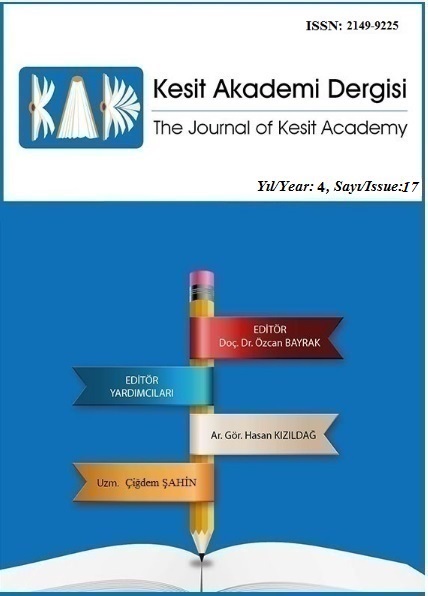SEYAHAT ACENTESİ ÇALIŞANLARININ SANAL KAYTARMA DAVRANIŞLARI VE İŞ MOTİVASYONU ARASINDAKİ İLİŞKİLERİN İNCELENMESİ
Author :
Abstract
Bu çalışmanın amacı; Eskişehir’de faaliyet gösteren seyahat acenteleri çalışanlarının sanal kaytarma davranışlarının, iş motivasyonlarına etkilerini belirlemektir. Çalışmada sanal kaytarma tek boyut olarak iş motivasyonu ise; yönetim tarzı, ücret ve ödüllendirme, güvenlik, takım çalışması ve kendini geliştirme alt boyutlarıyla değerlendirilmiştir. Çalışmanın evrenini Eskişehir’de faaliyet gösteren seyahat acenteleri çalışanlarının tamamı oluşturmaktadır. Evreninin tamamına ulaşmanın mümkün olmasından dolayı tam sayım yapılmıştır. Araştırmada anket yöntemi kullanılmıştır. Seyahat acentelerin bünyesindeki 205 çalışana anket bırakılmış, toplanan anketlerden 196 tanesi uygun bulunarak değerlendirmeye alınmıştır. Araştırmanın verileri güvenilirlik analizi, t testi , varyans analizi ve korelasyon analizi ile değerlendirilmiştir. Araştırmada elde edilen bulgulara göre, seyahat acenteleri çalışanlarının sanal kaytarma davranışları ile iş motivasyonunun alt boyutları olan ücret ve değerlendirme ile kendini geliştirme boyutu arasında anlamlı ve pozitif yönlü ilişki bulunmuştur.
Keywords
Abstract
The purpose of this study is to determine the relationship between cyberloafing behaviors and job motivation of the travel agencies employee’s in Eskişehir. In the study, cyberloafing is considered as one dimension and work motivation is evaluated by management style, salary and rewarding, security, team work and self-development sub-dimensions. The scope of the study consists of all the employees employed in all the travel agencies in Eskişehir. A complete inventory was carried out in the study as access to the whole scope was possible. Questionnaire technique was used in the study as an instrument for data collection in the study. Interviews were conducted with 205 employees at the travel agencies and 196 of them which were found to be appropriate for the study was submitted to statistical analysis for reliability analysis, t test, factor analysis and correlation analysis. According to the finding of this study, there is significant and positive relationship between cyberloafing behavior of travel agencies employees and salary and rewarding and self-development as sub-dimension of job motivation.
Keywords
- Akça, A. (2013). “Okul Yöneticilerinin İş Dışı İnternet Kullanım (Siber Aylaklık) Davranışlarının İncelenmesi”, Yıldız Teknik Üniversitesi Sosyal Bilimler Enstitüsü, Basılmamış Yüksek Lisans Tezi.
- Ay, F. A. (2006). “İşletmelerde Çalışanların Motivasyonlarını Etkileyen Faktörler; Bir alan Araştırması”, Cumhuriyet Üniversitesi Sosyal Bilimler Enstitüsü, Basılmamış Yüksek
- Blanchard, A.L. ve Henle, C.A. (2008). “Correlates of Different Forms of Cyberloafing: The Role of Norms and External Locus of Control”, Computers in Human Behaviour, C:24, ss.1067-1084.
- Belanger, F. ve Slyke, C.V. (2002). “Abuse or Learning?”, Communications of the ACM, C:45, ss.64-65.
- Büyüköztürk, Ş., (2011). Sosyal bilimler için veri analizi el kitabı- istatistik, araştırma deseni spss uygulamaları ve yorum. 13. Baskı, Ankara: Pegem Akademi, s. 124.
- Chun, T. X. ve Ya-Ping, C. (2010). An Empirical Study on The Determinants of Cyberloafing, IEEE , 978 – 1 -4244
- Çokluk, Ö., Şekercioğlu, G. & Büyüköztürk, Ş. (2010). Sosyal Bilimler İçin Çok Değişkenli İstatistik. SPSS ve LISREL uygulamaları. Ankara: Pegem Akademi Yayıncılık.
- Doorn, O.V.N. (2011). “Cyberloafing: A Multi-Dimensional Construct Placed in a Theoretical Framework”, Eindhoven University of Technology, Department Industrial Engineering and Innovation Sciences, Master Thesis
- Ersarı, G. ve Nakyikok, A. (2012) “İş görenin İçsel ve Dışsal Motivasyonunda Stresle Mücadele Tekniklerinin Rolü”, Atatürk Üniversitesi Sosyal Bilimler Enstitüsü Dergisi , C:16, No:1, ss. 81-101.
- Greenberg, J. ve Scott, K.S. (1996). “Why Do Workers Bite the Hands That Feed Them? Employ- ee Theft as a Social Exchange Process”, Research in Organizational Behavior, C:18,
- Jia, H.H. (2008). “Relationships Between The Big Five Personality Dimensions and Cyberloafing Behaviour”, Southern Illinois University. Doctorate Thesis.
- Kaplan, M. ve Öğüt, A. (2012). “Algılanan Örgütsel Adalet İle Sanal Kaytarma Arasındaki İlişkinin Analizi: Hastane Çalışanları Örneği”, İşletme Fakültesi Dergisi, C:13, No:1, ss.1-16
- Lavoie, J. A. A., & Pychyl, T. A. (2001). Cyberslacking and the procrastination superhighway: A web-based survey of online procrastination, attitudes, and emotion. Social Science Computer Review, 19(4), 431-444.
- Lim, V.K.G. (2002). “The IT Way of Loafing on The Job: Cyberloafing, Neutralizing and Organi- sational Justice”, Journal of Organisational Behaviour, C:23. No:5, ss.675-694.
- Mills, J.E. Hu, B. Beldona ve S. Clay, J. (2001). “Cyberslacking! A Liability Issue for Wired Workplaces”, Cornell Hotel and Restaurant Administration Quarterly, C:42, ss.34-47.
- Mottaz, J. C. (1985). “The Relative Importance of Intrinsic and Extrinsic Rewards as Determi- nants of Wok Satisfaction” , The Sociological Quarterly , C:26, No:3, ss.365- 385.
- Murphy, P. K. ve Alexander, P. A. (2000). “A Motivated Exploration of Motivation Terminolo- gy” , Contemporary Education Psychology , C:25, No:1, ss.3-53.
- Oravec, J.A. (2002). “Constructive Approaches to Internet Recreation in the Workplace”, Com- munications of the ACM, C:45, ss.60-63.
- Osterloh, M. F. ve Bruno S. (2000) “Motivation, Knowledge Transform And Organisational Forms”, Organisation Science , C:.11, No. 5, ss.538-550.
- Örücü, E. ve Yıldız, H. (2014). “İş yerinde Kişisel İnternet ve Teknoloji Kullanımı: Sanal Kay- tarma”, Ege Akademik Bakış, C:14, No:1, ss.99-114
- Özgür, E. (2006). “Performans Yönetimi ile Motivasyon İlişkisi Bir Uygulama”, Atatürk Üniver- sitesi Sosyal Bilimler Enstitüsü, Basılmamış Yüksek Lisans Tezi
- Pinder, C. C. (1998). Work Motivation in Organizational Behavior, Pretice-Hall. İnc, NJ
- Polzer-Debruyne A.M. (2008). “Psychological and Workplace Attributes that Influence Personal Web Use (PWU)”, Massey University, New Zealand, Doctorate Thesis.
